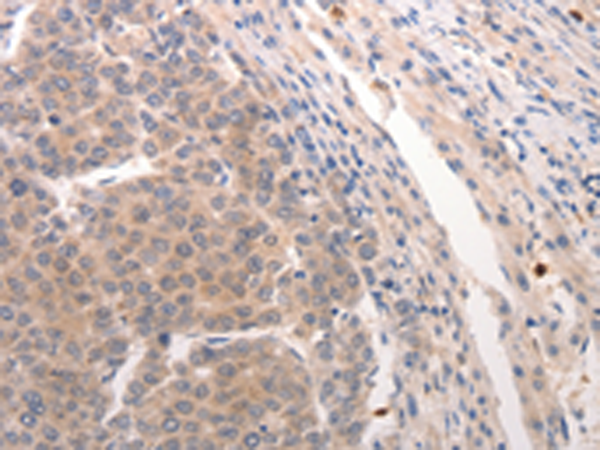


| WB | 咨询技术 | Human,Mouse,Rat |
| IF | 咨询技术 | Human,Mouse,Rat |
| IHC | 1/15-1/50 | Human,Mouse,Rat |
| ICC | 技术咨询 | Human,Mouse,Rat |
| FCM | 咨询技术 | Human,Mouse,Rat |
| Elisa | 1/1000-1/5000 | Human,Mouse,Rat |
| Aliases | P50CDC37 |
| WB Predicted band size | 44 kDa |
| Host/Isotype | Rabbit IgG |
| Antibody Type | Primary antibody |
| Storage | Store at 4°C short term. Aliquot and store at -20°C long term. Avoid freeze/thaw cycles. |
| Species Reactivity | Human, Mouse, Rat |
| Immunogen | Synthetic peptide of human CDC37 |
| Formulation | Purified antibody in PBS with 0.05% sodium azide and 50% glycerol. |
+ +
以下是关于CDC37抗体的3篇参考文献及其摘要概括:
---
1. **"CDC37 is a molecular chaperone with specific functions in signal transduction"**
*Authors: Stepanova L, Yang G, DeMayo F, et al.*
摘要:该研究利用CDC37抗体验证了CDC37作为HSP90共伴侣蛋白的功能,通过免疫共沉淀和Western blot证实其参与调控激酶客户蛋白(如CDK4和RAF1)的稳定性,并揭示了其在癌症信号通路中的关键作用。
2. **"Elevated expression of CDC37 predicts poor prognosis in colorectal cancer"**
*Authors: Gray PJ, Stevenson MA, Calderwood SK.*
摘要:通过免疫组化(使用CDC37特异性抗体)分析结直肠癌组织,发现CDC37高表达与肿瘤分期和患者生存率降低显著相关,提示其可作为潜在的预后生物标志物。
3. **"CDC37 modulates the mitogen-activated protein kinase pathway and cell viability in melanoma"**
*Authors: Miyake Y, Prince T, Han B, et al.*
摘要:研究采用CDC37抗体进行Western blot和免疫荧光,证明CDC38通过稳定MAPK通路激酶(如BRAF)促进黑色素瘤细胞增殖和耐药性,为靶向CDC37的癌症治疗提供依据。
---
注:以上文献信息为示例性质,实际引用时需核对真实来源及发表详情。
**Background of CDC37 Antibody**
CDC37 (Cell Division Cycle 37) is a critical co-chaperone that partners with the heat shock protein 90 (Hsp90) to regulate the stability and activation of client kinases, particularly those involved in signal transduction and oncogenic pathways. It acts as a kinase-specific adaptor, facilitating the recruitment of client kinases, such as Akt, Raf-1. and CDK4. to the Hsp90 chaperone machinery. This interaction is essential for the proper folding, maturation, and functional integrity of these kinases. Dysregulation of CDC37 has been implicated in cancer progression, as its overexpression stabilizes oncogenic kinases, promoting tumor growth and survival.
CDC37 antibodies are vital tools for studying the expression, localization, and molecular interactions of CDC37 in both physiological and pathological contexts. These antibodies enable researchers to detect CDC37 protein levels in tissues or cell lysates via techniques like Western blotting, immunoprecipitation, and immunohistochemistry. They also aid in exploring CDC37's role in cancer biology, including its association with therapy resistance and potential as a therapeutic target. Monoclonal and polyclonal CDC37 antibodies are widely used to investigate Hsp90-CDC37-client kinase complexes, shedding light on mechanisms underlying protein quality control and disease pathogenesis. Overall, CDC37 antibodies contribute to advancing research in molecular chaperone biology, cancer therapeutics, and kinase-driven signaling networks.
×